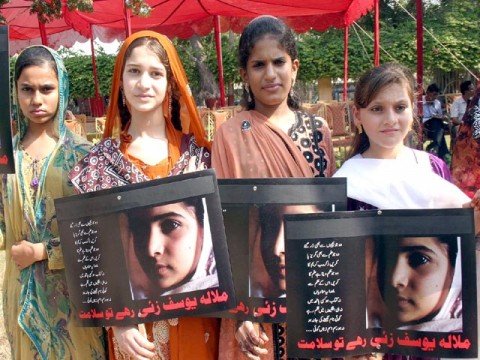
Millions of Pakistan’s poorest families will get cash sums if their child attends school, in a scheme announced ahead of a day of action for Malala Yousafzai, the schoolgirl shot by the Taliban.
Under the scheme, funded by the World Bank and UK, families would reportedly get $2 a month per child in school.
The news came as the UN held “Malala Day”, in the name of Malala Yousufzai, 15, a Pakistani education campaigner.
She is recovering in the UK after she and two others were shot in October.
Saturday has been declared a global day of action in Malala’s name aimed at getting school places for 32 millions girls around the world who are not attending classes.
The Waseela-e-Taleem programme was announced in Islamabad by Pakistani President Asif Ali Zardari and special UN envoy for global education, Gordon Brown.
“Malala’s dreams represent what is best about Pakistan,” said Gordon Brown, the former UK prime minister.

The initiative aims to enroll three million of the poorest children in education in the next four years and, according to Reuters, will see poor families receive $2 a month per child in primary school.
The cash will be distributed through the government’s Benazir Income Support Programme, designed to give small cash payments to needy families.
Those in the programme already receive $10 a month for basic expenditure, Reuters reported.
Meanwhile, tens of thousands of people around the world have signed an online petition calling for Malala Yousafzai to be nominated for the Nobel Peace Prize.
The UK government has also been urged to back the campaign, with advocates saying she represents those denied an education.
Doctors in the UK city of Birmingham, where Malala Yousafzai is being treated, say she is making progress.
Malala Yousafzai and two other schoolgirls were attacked as they returned home from school in Mingora in the Swat Valley in north-west Pakistan on October 9th.
The gunman who boarded the van in which she was travelling asked for her by name before firing three shots at her.
In early 2009 she wrote an anonymous diary for BBC Urdu about life under the Taliban, who had banned all girls in her area from attending school.